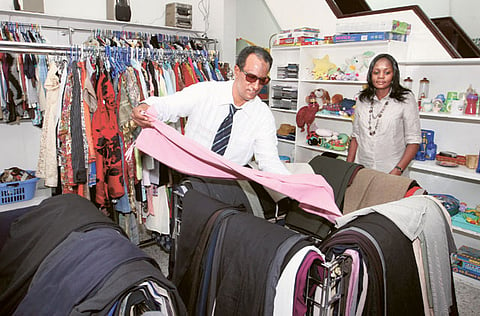Zara for Dh10, Mango for Dh15
A Zara dress for Dh10? Yes, that is the price you would pay for other branded dresses as well at the city's second-hand stores

DUBAI: "I once bought a Barbara Bui silk and velvet top for Dh5!" says Rose Fernandes. "It should have cost me approximately Dh7,000 to Dh10,000! And people wonder why I rummage through thrift stores. There are hidden treasures to be discovered!"
Her friend, Manuella, says, "One man's trash is another's treasure. I often find dresses, skirts and trousers from Motivi, Mango and Zara for Dh10 or Dh15. The clothes are in really good condition, as if they've been worn just once or twice."
Hanane Younes, operations and facilities supervisor at the Dubai Charity Centre (run by the Dubai Centre for Special Needs), the city's largest and most popular second-hand store, says their Karama shop is always packed. "Everything is sold at a fraction of its original cost, and only good quality products are sold," she says.
If the increasing numbers of shoppers are anything to go by, more people are choosing to make their fashion and household purchases from second-hand stores than ever before.
As people look for ways to curb spending, buying second or pre-loved items isn't the taboo it once used to be. In fact, the city's thrift, charity and second-hand shops are all the rage.
Younes says their thrift store in Karama does better business than ever before. "Although our primary aim is to generate profits for our special needs centre, we love being eco-friendly by recycling clothes and household items as well as giving the less fortunate the same advantages as the fortunate."
A walk through the store reveals amazing bargains. With men's suits being sold for as little as Dh20, children's clothes for Dh5, and everything else from books, shoes, toys and household items being sold for Dh5, going up to a maximum of Dh20, the store is a shopper's delight.
"I've just picked up a Vivaldi CD for my husband, an Aerosmith CD for me, a beautiful blanket for our baby, some soft toys, six white pots for our plants, a Zara shirt for my husband and a pink leather handbag for me, all for Dh75!" says Filipina Rosalinn Ruiz, a personal assistant in Dubai.
"If you look hard, you'll find a gem hidden amongst the stacks," says Bleese, who bought an original Gucci bag for under Dh300, at over 95 per cent off its original price.
Affordable for all
However, some of the city's stores sell nothing that costs more than Dh10, such as the Holy Trinity Thrift Store in Oud Metha. "Most of our clients are labourers who can't afford mall prices, and we make sure that our store stocks things they can afford," says the shop's spokesperson.
"We accept donations of just about everything that someone may want or need," he says. "From trinkets to bedsheets, clothes and toys… everything costs just a few dirhams. We're running this thrift store not to make a profit, but to provide for those can't afford niceties."
The thrift store is packed on weekends. "Most of our clients are those on the lower end of the financial scale in Dubai. On weekdays however, we have quite a few bargain hunters who stop by in the hope of bagging a bargain, which they usually do."
Ashfaq Mohammad, a construction worker, says, "Even though I don't go to church, I accompany my friends to the shop after their prayers. I have found many things including a Dh3 lamp for the room I share with my colleagues, and some nice jewellery for Dh5 for my wife."
Meanwhile, over in Dubai Festival City, the crowd of shoppers attracted to the Book N Bean, the second-hand book store, is completely different.
The books aren't sold at bottom-of-the-barrel prices. At an average of 50 per cent off the original price, with a half-price buy-back guarantee, the store attracts book-lovers from across the city. Owner Mike McGinley, an American expat who opened his first second-hand book store 19 years ago in Muscat, Oman, says he's always been a book lover. "Coffee and a good book always go together," he says. "So when I met Brian Hudson, a coffee man himself, we decided we'd be just what the book-lovers of the city need: Book, that's me; and [coffee] Bean, that's Brian."
"The store does extremely well since there are tons of people who love books — a shop such as ours gives them the opportunity to read whatever they want, often at one-third of the price, assuming they participate in our buy-back scheme."
"Second-hand book stores are so common in the US; here, they're still a novelty," he says. Hence a majority of the customers are Western expats, followed by Indian expats.
German expat Melanie Beese, founder of the weekly second-hand markets in Al Safa, said: "In the early days, my clientele was largely European. Eventually, Filipinos became our target audience, and now the concept of buying seconds has become a viable option for expats and Arabs alike."
As the dust around thrift store shopping settles and Dubai's elite popularise the concept of bagging bargains, there's never been a better time to invest in seconds, charity and thrift stores.


